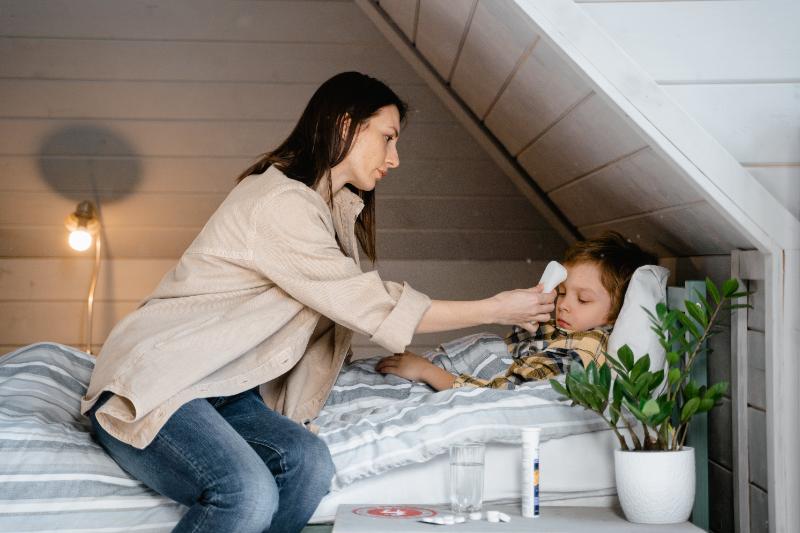A fever occurs when your child's immune system actively fights an infection and raises its temperature in response. Fevers are not considered an illness on their own but rather a symptom of an underlying condition.
Although they may be uncomfortable, fevers are rarely a cause for concern. However, when co-occurring symptoms like headaches or nausea start to appear, it may be best to consult your child’s doctor.
If your child has a mild fever, try monitoring their temperature while keeping an eye out for their behavior and mood. These can offer valuable insights into their state of health and can let you know when it might be best to look for professional attention.
Body temperatures for children and infants tend to be slightly higher than for older children and adults. However, healthcare providers usually identify a temperature of more than 100.4° F as a fever.
Other symptoms of a fever in children may include:
- Low energy and activity levels
- Fussy and cranky mood
- Decreased appetite
- Increased thirst
- Chills and sweating
- Red or flushed skin
Body temperature can be measured using:
- Oral thermometers
- Rectal thermometers
- Ear thermometers
While you don’t need to continuously take your child’s temperature if they are sleeping or playing, you should do so if you notice their energy levels seem lower than usual.
The best way to take a temperature will depend on your child’s age:
- For 3-year-olds and younger, a rectal thermometer is the most accurate way to take a temperature. If their temperature is higher than 100.4° F, it is a fever.
- For children who are four or older, you can use a mouth thermometer. If their temperature is higher than 100° F, it is a fever.
- You can use an axillary (under the armpit) thermometer for children older than five years. If their temperature is higher than 99° F, it is a fever.
A fever is not an illness but rather a symptom of an underlying issue that results in an increase in body temperature. Some of these issues may include:
- Infection: Illnesses like the flu could cause the body to increase its temperature since a fever helps stimulate the immune system to fight the infection.
- Overdressing: In newborn babies, overdressing could cause a fever since they are not able to regulate their body temperature as well as older
- Immunizations: It is usual for babies and young children to get a mild fever that lasts less than a day after getting vaccinated.
- Teething: It is common for children to get mild fevers if their teeth are starting to come out.
A fever may not be a serious issue if your child is three months or older, is still interested in playing, is drinking enough fluids, is alert and smiling, and has normal skin color.
In general, when a healthy child has a fever and does not exhibit significant changes in their behavior, it is typically not a cause for concern.
In most cases, fever does not need specialized care to reduce its symptoms. You can help lower your child's body temperature by following simple home care tips.
If your child has a fever, you can try the following home remedies to reduce their body temperature:
- Give them plenty of fluids to avoid dehydration.
- Check their body temperature regularly during the night.
- If suitable, give them paracetamol or ibuprofen to help soothe the symptoms.
- Dress them lightly.
- Give them a warm sponge bath, but stop if they start feeling cold or are shivering.
- Keep the room at a comfortable temperature.
- Ensure they get plenty of rest and keep them home from school until their temperature is normal for 24 hours.
If the fever persists even after you’ve tried to lower your child’s temperature at home, you may need to call your pediatrician.
With newborn babies, it is important to pay close attention to any signs other than the fever since the fever may be a symptom of an infection that needs prompt medical attention.
Your doctor may suggest performing exams to rule out any infections and start a medication treatment to fight any virus or bacteria that could be causing the fever.
Call emergency care right away if you notice any of the following signs in your baby or child:
- A stiff neck
- A rash that does not fade when you slightly press your finger or a glass against it
- Bothered by light
- Unusually cold hands and feet
- Blue, pale, or blotchy skin, lips, or tongue
- Weak, high-pitched crying
- Sluggishness or trouble waking up
- Trouble breathing
- Leaning forward and drooling
- Severe belly pain
- Severe shaking


